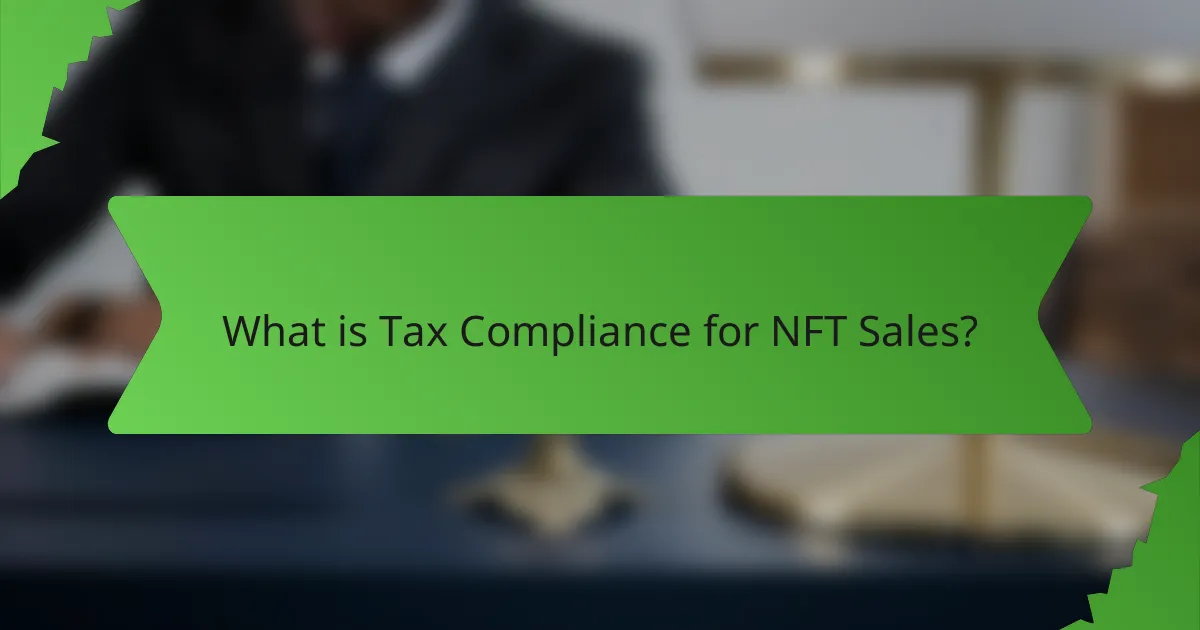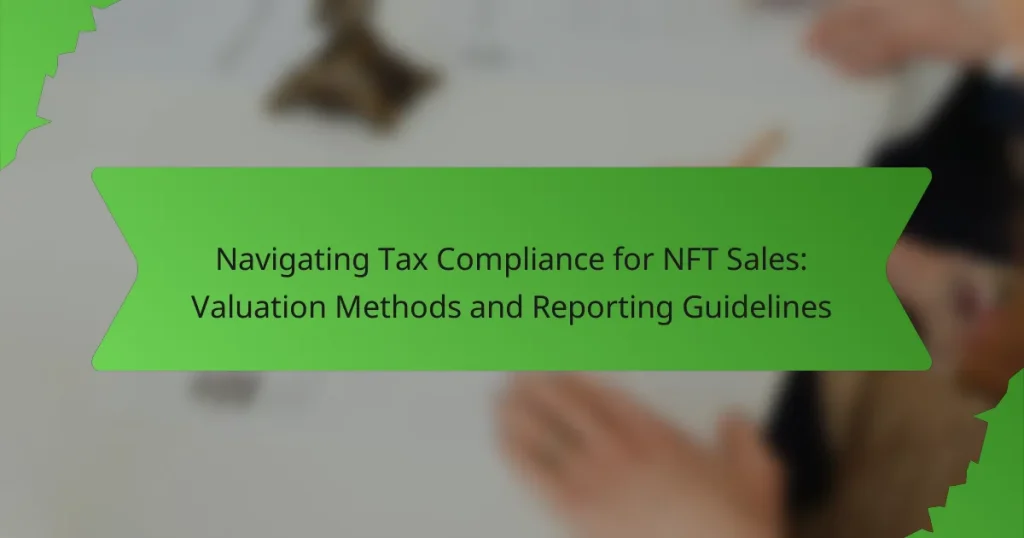Tax compliance for NFT sales is the adherence to relevant tax laws and regulations concerning the sale of non-fungible tokens. This includes accurately reporting income from NFT transactions, determining the fair market value at the time of sale, and tracking gains or losses. Sellers must understand different valuation methods, such as market comparison, income approach, and cost approach, to assess the value of NFTs appropriately. In the U.S., the IRS classifies NFTs as property, necessitating the reporting of capital gains or losses on tax returns, with strict guidelines for documentation and record-keeping to avoid penalties.

What is Tax Compliance for NFT Sales?
Tax compliance for NFT sales refers to the adherence to tax laws and regulations applicable to the sale of non-fungible tokens. This includes accurately reporting income generated from NFT transactions. Sellers must determine the fair market value of NFTs at the time of sale. They also need to track any gains or losses from these transactions. Different jurisdictions may have varying requirements for reporting. For example, in the U.S., the IRS treats NFTs as property for tax purposes. This means that capital gains taxes may apply. Proper documentation and record-keeping are essential for compliance. Failure to comply can result in penalties or audits.
How do NFTs impact tax obligations?
NFTs are treated as property for tax purposes. This means that selling or trading NFTs can trigger capital gains taxes. When an NFT is sold for more than its purchase price, the seller may owe taxes on the profit. Conversely, if an NFT is sold for less than its purchase price, the seller may report a capital loss. Additionally, creators of NFTs may face income tax obligations when they receive payments for their work. The IRS requires reporting of all cryptocurrency transactions, including those involving NFTs. Accurate record-keeping of purchases, sales, and valuations is essential for compliance. Failure to report NFT transactions can lead to penalties.
What are the tax implications of buying and selling NFTs?
Buying and selling NFTs can have significant tax implications. When an NFT is purchased, the buyer may incur sales tax depending on local regulations. Upon selling an NFT, the seller may be subject to capital gains tax. This applies if the NFT is sold for more than its purchase price. The tax rate can vary based on the holding period of the NFT. Short-term capital gains are typically taxed at ordinary income rates. Long-term capital gains may benefit from lower tax rates. Additionally, NFT creators may face income tax on profits from sales. Documentation of transactions is crucial for accurate reporting. The IRS treats NFTs as property, making traditional tax rules applicable.
How do different jurisdictions treat NFT transactions?
Different jurisdictions have varying approaches to NFT transactions. In the United States, NFTs may be treated as property for tax purposes. This means capital gains tax could apply upon sale. In the European Union, the treatment can differ by member state. Some countries classify NFTs as digital assets, while others may view them as collectibles. In the United Kingdom, NFTs are generally subject to capital gains tax. Australia has indicated that NFTs could be treated similarly to other digital currencies. Each jurisdiction’s stance affects reporting requirements and tax implications for NFT transactions.
Why is understanding valuation methods essential?
Understanding valuation methods is essential for accurately determining the worth of assets, especially in NFT sales. Valuation methods provide frameworks for assessing the fair market value of NFTs. This is crucial for tax compliance, as accurate valuations impact tax liabilities. Different methods, such as market comparison and income approach, yield varying results. Misvaluation can lead to underpayment or overpayment of taxes. According to the IRS, accurate reporting of asset value is necessary for compliance. Thus, understanding these methods ensures adherence to tax regulations and avoids potential penalties.
What are the primary methods for valuing NFTs?
The primary methods for valuing NFTs include market-based valuation, cost-based valuation, and income-based valuation. Market-based valuation analyzes recent sales of comparable NFTs to determine a fair market price. Cost-based valuation assesses the expenses incurred to create the NFT, including artist fees and production costs. Income-based valuation estimates the potential future income generated from the NFT, such as royalties from secondary sales. Each method provides a different perspective on the NFT’s value, reflecting its unique attributes and market dynamics.
How does the market influence NFT valuation?
The market significantly influences NFT valuation through supply and demand dynamics. When demand for a specific NFT increases, its value typically rises. Conversely, if supply exceeds demand, the value may decline. Market trends, such as popularity of certain artists or collections, also impact valuations. For example, high-profile sales can create a perception of value, driving interest and prices up. Additionally, external factors like cryptocurrency market fluctuations affect NFT pricing. The overall market sentiment, influenced by news and trends, plays a crucial role in determining how much buyers are willing to pay.

What are the key valuation methods for NFT sales?
The key valuation methods for NFT sales include market comparison, income approach, and cost approach. Market comparison involves analyzing recent sales of similar NFTs to determine value. This method relies on active marketplaces and comparable sales data. The income approach estimates future income generated by the NFT, discounted to present value. This method is useful for NFTs that generate royalties or other income streams. The cost approach calculates the total cost of creating the NFT, including time, resources, and technology used. This method reflects the investment made by the creator. Each method provides a different perspective on the NFT’s value, catering to various contexts and buyer motivations.
How do cost-based valuation methods work?
Cost-based valuation methods determine the value of an asset based on the costs incurred to acquire or create it. These methods consider direct costs, indirect costs, and any overhead involved. The primary approach is to calculate the total expenses associated with the asset. This includes purchase price, production costs, and any additional expenditures.
Cost-based methods are often used for tangible assets, such as real estate or equipment. They provide a baseline value, reflecting the investment made rather than market fluctuations. This method is particularly useful in tax compliance for NFTs, where establishing a clear cost basis is essential for reporting gains or losses. Accurate cost tracking ensures compliance with tax regulations and helps in determining taxable events.
What factors are considered in cost-based valuations?
Cost-based valuations consider several factors. These include the historical cost of the asset. Replacement cost is also a significant factor. Additionally, the cost of production is relevant. Other considerations include depreciation and amortization. The economic environment can influence valuations. Market demand and supply factors are also important. Lastly, any associated transaction costs must be accounted for. These factors collectively help determine the fair value of an asset in cost-based valuations.
When is a cost-based approach most appropriate?
A cost-based approach is most appropriate when determining the value of NFTs that lack a clear market price. This method is useful for unique or newly created NFTs without prior sales data. It relies on the costs incurred during the creation or acquisition of the asset. This includes expenses such as artist fees, transaction fees, and other related costs. For example, if an NFT was created for $1,000 in production costs, that amount can serve as its valuation. The cost-based approach provides a tangible basis for valuation in the absence of market comparables. This method aligns with tax compliance requirements by offering a clear, documented basis for asset valuation.
What is market-based valuation for NFTs?
Market-based valuation for NFTs assesses their worth based on current market conditions. This method relies on comparable sales data of similar NFTs. It evaluates recent sales prices to establish a fair market value. Factors influencing this valuation include rarity, demand, and market trends. An NFT’s price can fluctuate based on buyer interest and market activity. Market-based valuation is commonly used in tax compliance for reporting gains or losses. This approach aligns with standard valuation practices in other asset classes. Accurate valuation is essential for proper tax reporting and compliance.
How do comparable sales inform market-based valuations?
Comparable sales inform market-based valuations by providing data on recent transactions of similar assets. This method allows for the assessment of an asset’s value based on what similar items have sold for in the market. By analyzing these sales, valuators can identify trends and establish a price range for the asset in question. For example, if several NFTs of comparable rarity and quality sold for an average of $1,000, this figure can guide the valuation of a new NFT. This approach is commonly used in real estate and can be adapted for NFTs, where market activity reflects demand and perceived value. The accuracy of this method relies on the selection of truly comparable sales, ensuring that differences in attributes are accounted for in the valuation process.
What challenges arise in market-based NFT valuation?
Market-based NFT valuation faces several challenges. One significant challenge is the volatility of the NFT market. Prices can fluctuate dramatically within short time frames. This instability complicates establishing a reliable valuation. Additionally, the uniqueness of each NFT makes comparative analysis difficult. Unlike traditional assets, NFTs often lack direct market analogs.
Another challenge is the lack of standardized valuation methods. Different platforms may use varying criteria for valuation. This inconsistency can lead to confusion among buyers and sellers. Furthermore, the scarcity of historical sales data limits market insights. Without sufficient data, accurate trend analysis becomes challenging.
Legal and regulatory uncertainties also impact NFT valuation. Existing tax laws may not adequately address NFT transactions. This ambiguity creates complications in reporting and compliance. Overall, these factors contribute to the complexities of market-based NFT valuation.
What are income-based valuation methods for NFTs?
Income-based valuation methods for NFTs assess the value based on expected future income. These methods include discounted cash flow (DCF) analysis and income capitalization approach. DCF calculates the present value of expected future cash flows from the NFT. The income capitalization approach estimates value by dividing the expected income by a capitalization rate. Both methods require reliable income projections and market data to ensure accuracy. These valuation methods are increasingly relevant as NFT markets mature. They help establish a fair market value for tax compliance and reporting purposes.
How does future cash flow estimation apply to NFTs?
Future cash flow estimation applies to NFTs by evaluating their potential income generation. This estimation is crucial for determining the value of NFTs for tax compliance. NFTs can generate revenue through royalties, resale, or licensing agreements. Accurately forecasting these cash flows helps in assessing their market value. Market trends and historical sales data can inform these projections. For instance, if an NFT has consistently sold for high prices, future cash flows may be estimated similarly. This method aids in compliance with tax regulations by providing a basis for asset valuation. Ultimately, future cash flow estimation ensures that NFT owners report accurate values for tax purposes.
What are the risks associated with income-based valuations?
Income-based valuations carry several risks. These include reliance on inaccurate income projections. Overestimating future earnings can lead to inflated valuations. Market fluctuations can also impact income stability. Changes in consumer preferences may affect revenue streams. Additionally, tax implications can arise from misvaluations. Regulatory scrutiny may increase if valuations are questioned. Finally, lack of comparable data can introduce uncertainty in the valuation process.

What are the reporting guidelines for NFT sales?
NFT sales must be reported as capital gains or losses on tax returns. The IRS treats NFTs as property for tax purposes. Sellers must determine the fair market value at the time of sale. This value is typically the sale price or the price of a similar NFT. If the NFT was acquired through purchase, the cost basis is the purchase price. If acquired through a gift, the basis is the fair market value at the time of the gift. Sellers must keep accurate records of transactions, including dates and amounts. Failure to report accurately can lead to penalties. The IRS provides guidelines for reporting in IRS Notice 2014-21.
How should NFT sales be reported for tax purposes?
NFT sales should be reported as capital gains for tax purposes. When an NFT is sold for more than its purchase price, the profit is taxable. Sellers must calculate the gain by subtracting the original purchase price from the sale price. This applies to both individuals and businesses involved in NFT transactions. The IRS considers NFTs as property, similar to stocks or real estate. Accurate record-keeping of purchase prices, sale prices, and transaction dates is essential. Taxpayers should report these transactions on Schedule D of Form 1040. Failure to report NFT sales can lead to penalties and interest on unpaid taxes.
What documentation is required for reporting NFT transactions?
Documentation required for reporting NFT transactions includes proof of purchase, sales records, and transaction history. Proof of purchase typically consists of receipts or invoices from the NFT marketplace. Sales records should detail the sale price and date of transfer. Transaction history can be obtained from blockchain explorers or the NFT platform used. These documents help establish the cost basis and proceeds for tax reporting purposes. Accurate documentation is essential for compliance with tax regulations.
How can NFT creators and sellers prepare for audits?
NFT creators and sellers can prepare for audits by maintaining comprehensive records of all transactions. This includes documenting the sale price, date, and buyer information for each NFT. Additionally, creators should track the costs associated with creating and selling NFTs, such as gas fees and platform fees. They must also ensure compliance with tax regulations by understanding the tax implications of their sales. Keeping accurate financial statements and receipts is essential for substantiating claims during an audit. Utilizing accounting software designed for cryptocurrency transactions can streamline this process. Regularly reviewing these records can help identify any discrepancies before an audit occurs. Finally, consulting with a tax professional experienced in NFTs can provide valuable guidance and ensure compliance with relevant laws.
What are common pitfalls in NFT tax compliance?
Common pitfalls in NFT tax compliance include incorrect valuation, failure to report income, and misclassification of transactions. Incorrect valuation occurs when individuals underestimate the fair market value of NFTs at the time of sale. This can lead to underreporting capital gains. Failure to report income happens when NFT creators do not declare earnings from sales or royalties. Misclassification of transactions may arise when individuals treat NFT sales as personal use rather than business income. Each of these pitfalls can result in penalties or audits from tax authorities. Accurate record-keeping and understanding tax obligations are essential to avoid these issues.
How can misvaluation affect tax reporting?
Misvaluation can significantly impact tax reporting by leading to incorrect tax liabilities. When assets, such as NFTs, are misvalued, reported income may not reflect actual gains or losses. This can result in taxpayers overpaying or underpaying their taxes. For instance, overvaluing an NFT can inflate reported income, causing higher tax obligations. Conversely, undervaluing may lead to tax underreporting, which can trigger audits or penalties. Accurate valuation is crucial for compliance with tax regulations. The IRS requires taxpayers to report gains based on fair market value, emphasizing the importance of precise valuation in tax reporting.
What mistakes should be avoided in NFT tax compliance?
Common mistakes to avoid in NFT tax compliance include failing to report all transactions. Many individuals overlook the need to track every sale and purchase of NFTs. Inaccurate valuation of NFTs can lead to incorrect tax calculations. It’s essential to use a consistent method for valuing NFTs, such as fair market value at the time of sale. Misclassifying NFTs as collectibles or securities can also result in tax issues. Each classification has distinct tax implications. Not keeping proper records of transactions and related expenses can complicate compliance. Accurate documentation is crucial for substantiating claims during audits. Lastly, misunderstanding local and federal tax laws can lead to non-compliance. Each jurisdiction may have different requirements for NFT taxation.
What best practices can ensure effective tax compliance for NFT sales?
Maintain accurate records of all NFT transactions. This includes purchase prices, sale prices, and associated fees. Proper documentation aids in reporting capital gains or losses. Understand the tax implications of NFT sales in your jurisdiction. Different countries have varying regulations on digital assets. Consult a tax professional familiar with cryptocurrency and NFTs. They can provide tailored advice based on individual circumstances. Report NFT transactions on tax returns appropriately. This may involve declaring income or capital gains. Stay updated on evolving tax laws regarding NFTs. Regulatory frameworks are constantly changing in response to market developments.
How can NFT sellers stay updated on tax regulations?
NFT sellers can stay updated on tax regulations by regularly consulting official government resources. The IRS website provides current information on crypto and NFT tax obligations. Sellers should also follow reputable tax advisory firms that specialize in digital assets. Subscribing to newsletters focused on cryptocurrency regulations can provide timely updates. Joining online forums or communities dedicated to NFTs can facilitate knowledge sharing among peers. Attending webinars and workshops on crypto taxation is another effective way to gain insights. Engaging with tax professionals who understand NFTs ensures compliance with evolving regulations. Staying informed helps sellers avoid potential penalties and optimize their tax strategies.
What tools can assist in tracking NFT transactions for tax purposes?
Tools that assist in tracking NFT transactions for tax purposes include blockchain explorers, NFT portfolio trackers, and specialized tax software. Blockchain explorers like Etherscan allow users to view transaction histories and wallet activities. NFT portfolio trackers such as Nansen and DappRadar help users monitor their NFT holdings and sales. Specialized tax software like CoinTracker and TaxBit integrates with wallets and exchanges to calculate gains and losses. These tools provide accurate records necessary for tax reporting and compliance.
Tax compliance for NFT sales involves adhering to tax laws and regulations related to non-fungible tokens, including accurate income reporting and determining fair market value at the time of sale. The article outlines the impact of NFTs on tax obligations, detailing capital gains taxes applicable upon sale and the importance of proper documentation. It explores various valuation methods—market-based, cost-based, and income-based—essential for compliance, as well as the reporting guidelines mandated by tax authorities. Additionally, it highlights common pitfalls in NFT tax compliance and best practices to ensure accurate reporting and adherence to evolving regulations.




